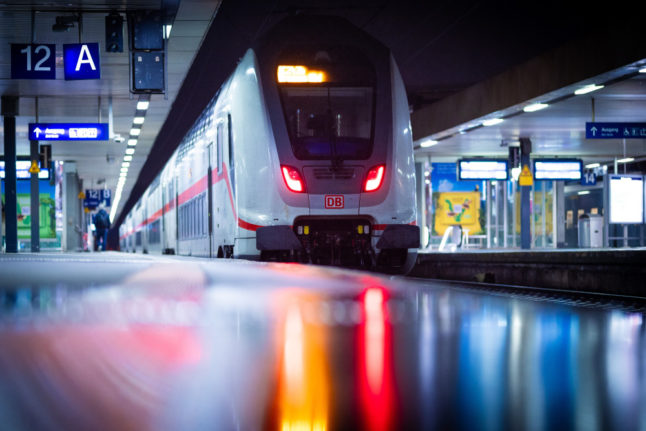Negotiations between the German Train Drivers’ Union (GDL) and Deutsche Bahn (DB) have failed to lead to an agreement, so the GDL has announced its longest ‘warning strike’ to date. Passenger train drivers are expected to walk off the job from 2am Wednesday until 6 pm on Friday.
Freight train stoppages may begin as early as Tuesday evening at 6 pm.
In response, DB has announced an emergency timetable, and says it will provide further updates as quickly and comprehensively as possible. Additionally the company is trying to challenge the legality of the strike in Germany’s Labour Court in Frankfurt am Main. A company spokesperson has called it “absolutely superfluous.”
READ ALSO: German train drivers to hold three-day strike
Which trains are affected?
The strike is expected to affect millions of rail passengers this week. DB’s emergency timetable will offer extremely limited services from Wednesday to Friday, with a number of long distance and regional trains to be cancelled.
The company has announced that longer trains will be used for the available journeys to accommodate as many people as possible.
“Nevertheless, a ride cannot be guaranteed,” DB announced on Sunday. Additionally, DB has asked passengers to avoid non-essential travel during the strike.
As Germany’s largest employer of train drivers, DB manages not only long-distance passenger trains such as ICE, IC, EC, and Nightjet trains, but also regional trains and S-Bahn lines.
The strike is nationwide and impacts are expected to be felt across the country. Coming amidst ongoing road obstructions in some places due to farmers’ protests, travel could be particularly hindered across Germany during this time.
READ ALSO: Where are farmers blocking traffic around Germany on Monday?
Customers can usually find up-to-date information about their train route via the Bahn app or the Deutsche Bahn site. It’s worth double checking these resources before leaving home, as additional trains may be cancelled last-minute during the strike.
A strike hotline has also been set up for individual information (08000 99 66 33).
It’s worth noting that the U-Bahn and buses are not affected. For some local journeys, these services may serve as a viable alternative.
During the two previous GDL warning strikes, Deutsche Bahn was able to maintain around 20 percent of the usual long-distance services. In regional transport, the impact varied greatly from region to region.
What happens to current ticket holders?
DB has said that all ticket holders who postpone their journeys due to the strike will be able to reschedule for later dates. Passengers can also bring their journeys forward to Tuesday.
Also, the train-specific limitation of tickets will be lifted during strike times – meaning customers who have a ticket for a cancelled train can ride any available replacement train instead. Tickets are valid to their original destination even via a different route, so in some cases customers may complete their journeys with a different combination of trains. Seat reservations can be cancelled free of charge.
Tickets for cancelled trains may also be refunded for a voucher or as a payment, free of charge. As always, DB customers who face delays may be partly reimbursed for their ticket in many cases.
READ ALSO: How to get compensation for delayed or cancelled trains in Germany
Why are train drivers striking?
GDL workers have been in negotiations with DB over wages and working conditions since last year. By the end of November, the GDL announced that talks with DB had failed. Previous warning strikes were eventually paused during GDL’s self-imposed “Christmas truce,” which has now come to an end.
A vote by members of the GDL decided that warning strikes this year may last longer than those of previous years – or until a satisfactory agreement between the union and the company is reached.
According to Deutschlandfunk, the GDL has reportedly demanded a reduction in the working week from 38 to 35 hours with full wage compensation, as well as a raise of €555 per month and an inflation compensation bonus of €3,000.
In response, DB’s Chief Human Resources Officer has suggested a plan in which drivers’ weekly hours would be more flexible, but drivers who opt to work less would have their pay reduced accordingly.
The GDL rejected this offer, calling it “insubstantial and poisoned.”
Additionally, DB has recently filed a lawsuit against the GDL before the State Labour Court in Hesse for its founding of the Fairtrain cooperative last summer. DB sees the cooperative as a competitive employer, and therefore questions the collective bargaining capacity of the GDL.



 Please whitelist us to continue reading.
Please whitelist us to continue reading.
Member comments